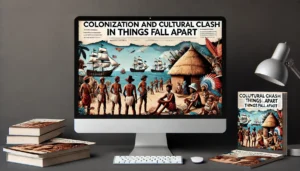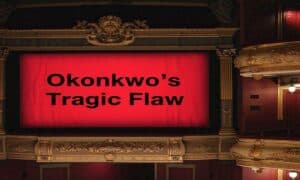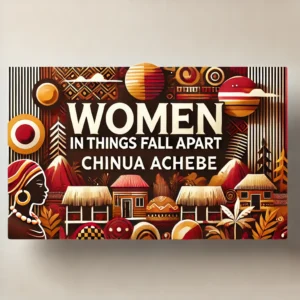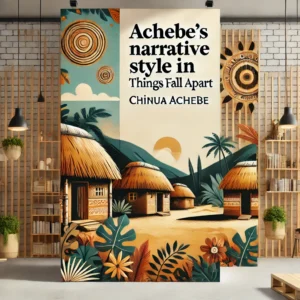Igbo Language and Oral Traditions in Things Fall Apart
Chinua Achebe’s Things Fall Apart is not just a novel about colonial intrusion; it is also a celebration of Igbo culture, language, and oral traditions. Achebe, aware of the dangers of colonial narratives misrepresenting African societies, uses language as a tool of resistance. His linguistic choices, especially his use of Igbo proverbs, folktales, and traditional expressions, preserve and honor the oral traditions of the Igbo people.
This note explores Achebe’s linguistic style, the role of Igbo proverbs, and the significance of folktales in conveying cultural depth and historical authenticity.
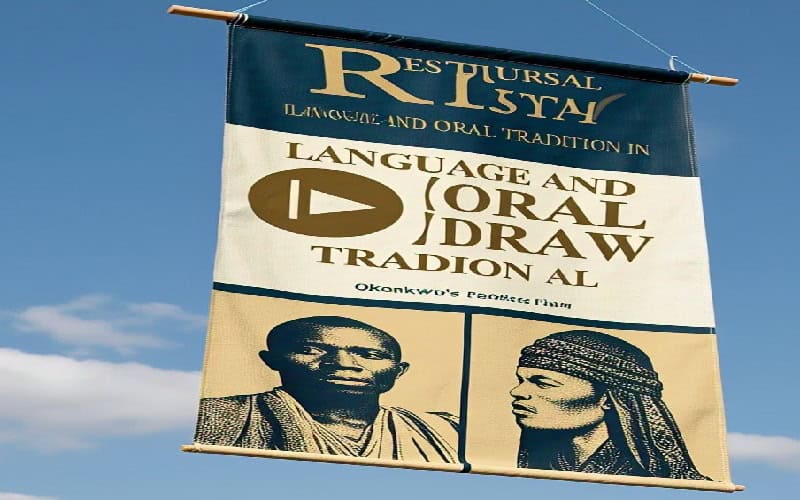
Achebe’s Linguistic Choices
Achebe made a deliberate choice to write Things Fall Apart in English, the language of the colonizers. However, he modified English to carry the rhythm, structure, and expressions of the Igbo language. This allowed him to:
- Bridge the gap between African oral traditions and Western literary forms.
- Challenge colonial portrayals of African cultures as primitive.
- Ensure that the novel reaches a global audience while preserving Igbo identity.
Achebe’s English is infused with Igbo words, phrases, and proverbs, making it a unique form of storytelling that remains deeply rooted in indigenous traditions.
The Role of Igbo Proverbs
Achebe famously states in the novel:
“Proverbs are the palm oil with which words are eaten.”
Proverbs are essential in Igbo speech, acting as wisdom carriers, moral lessons, and social commentaries. In Things Fall Apart, they:
1. Preserve Igbo Philosophy and Worldview
- Proverbs reflect traditional beliefs, values, and wisdom.
Example: “If a child washes his hands, he can eat with kings.”
This teaches that hard work and respect elevate one’s status.
2. Reinforce Themes of Change and Fate
Example: “The lizard that jumped from the high iroko tree said he would praise himself if no one else did.”
This highlights self-reliance and personal achievement, key to Okonkwo’s character.
3. Deepen Characterization
- Elders, like Obierika and Uchendu, often use proverbs to offer wisdom.
- Okonkwo, who values action over words, underestimates the power of language, leading to his downfall.
By integrating these proverbs, Achebe captures the oral richness of Igbo culture, ensuring that even in an English text, Igbo linguistic heritage remains intact.
Folktales as Cultural Memory and Moral Lessons
Folktales play a crucial role in Igbo society, serving as educational tools for children and a way to pass down cultural history. In Things Fall Apart, folktales symbolize:
1. The Power of Storytelling
- Nwoye’s love for his mother’s folktales contrasts with Okonkwo’s rigid masculinity.
- His attraction to these gentle, moralistic stories signals his rebellion against Okonkwo’s values.
2. Moral and Social Instruction
The Tortoise and the Birds tale (told by Ekwefi to Ezinma) illustrates greed and its consequences.
The tortoise, tricking the birds to gain food, ultimately falls to his doom, much like Okonkwo’s unchecked ambition leads to his downfall.
3. Cultural Resilience
- The presence of folktales in the novel emphasizes that Igbo traditions were rich and complex long before colonialism.
- Even as British rule spreads, oral tradition remains a symbol of enduring Igbo identity.
Conclusion
Achebe’s use of Igbo-infused English, proverbs, and folktales makes Things Fall Apart a linguistic and cultural bridge. By weaving Igbo oral traditions into a Western literary form, Achebe not only preserves his heritage but also challenges colonial narratives. The novel stands as proof that African storytelling is as rich and profound as any written tradition, proving that language is not just a means of communication but a vessel of cultural survival.
#Igbo language and oral traditions in Things Fall Apart #Igbo language and oral traditions in Things Fall Apart #Igbo language and oral traditions in Things Fall Apart #Igbo language and oral traditions in Things Fall Apart #Igbo language and oral traditions in Things Fall Apart #Igbo language and oral traditions in Things Fall Apart #Igbo language and oral traditions in Things Fall Apart #Igbo language and oral traditions in Things Fall Apart #Igbo language and oral traditions in Things Fall Apart #Igbo language and oral traditions in Things Fall Apart #Igbo language and oral traditions in Things Fall Apart #Igbo language and oral traditions in Things Fall Apart #Igbo language and oral traditions in Things Fall Apart
Read More
Masculinity in Thing Fall Apart
Colonization and Cultural Clash in Things Fall Apart
Achebe’s Narrative Style in Things Fall Apart
Introduction to Things Fall Apart
Frantz Fanon’s The Wretched of the Earth
Postcolonialism and Resistance
Orientalism and The Colonizer’s Gaze and the Creation of the ‘Other
Plot Construction in Pride and Prejudice
Introduction to Fiction and Non Fiction
Of Death — Francis Bacon (Text)
Of Truth Critical Analysis by Sir Francis Bacon
Of Truth by Francis Bacon Summary
Visit Us on our Facebook Page:

